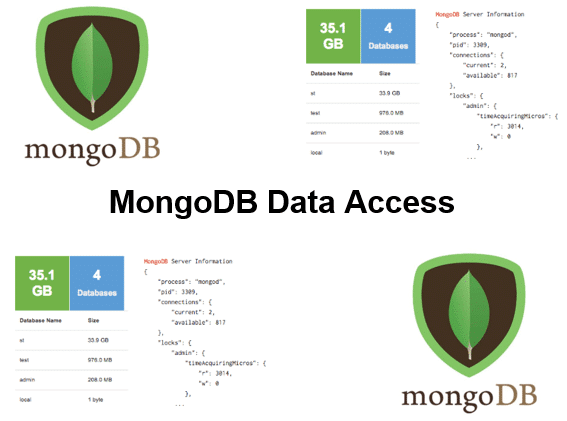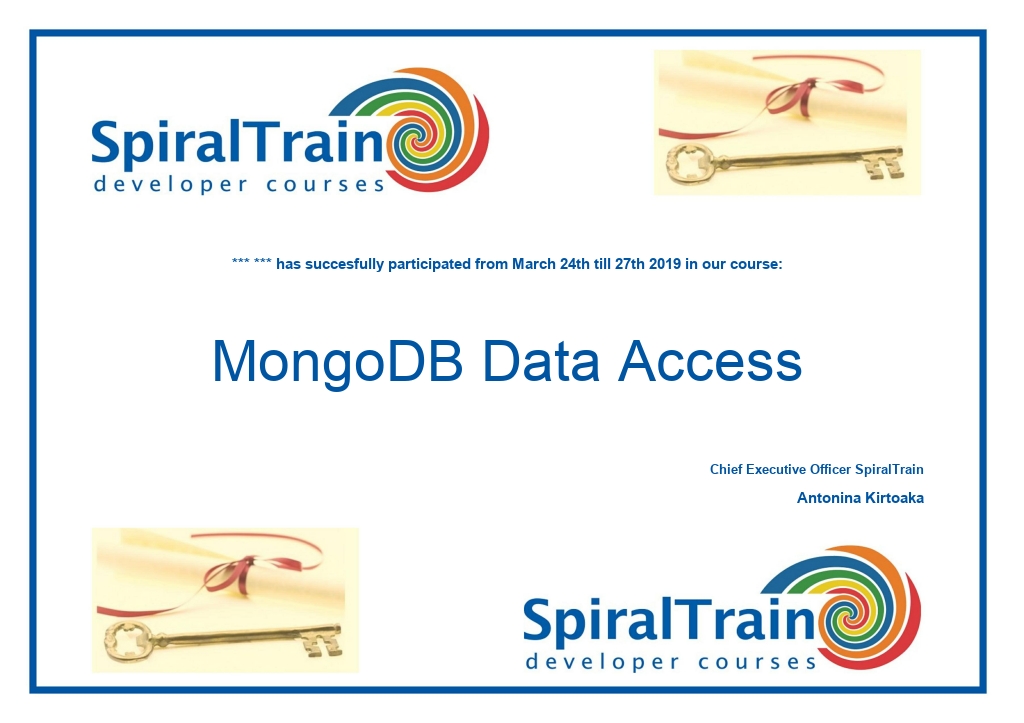-
Learning by doing
-
Trainers with practical experience
-
Classroom training
-
Detailed course material
-
Clear content description
-
Tailormade content possible
-
Training that proceeds
-
Small groups
In the course MongoDB Data Access participants learn to access and manage the document-oriented database MongoDB. MongoDB is an open source NoSQL database and the documents are stored in binary JSON format. MongoDB has no support for joins and is not ACID compliant since transaction support is limited.
The course MongoDB Data Access starts with a discussion of the MongoDB Architecture, the characteristics of the JSON-Based Document Store and the scalability of MongoDB. Installing and starting MongoDB and using the JavaScript console is treated as well.
Next the MongoDB Data Model is covered with the _id identifier, capped collections, blobs, schema evolution and polymorphic schemas. Attention is also paid to MongoDB drivers, the MongoDB shell and network access.
Queries in MongoDB are also discussed. Database creation is covered as well as insert queries and the use of Find One, All, Some, MapReduce, Projections and Pagination.
The course MongoDB Data Access then pays attention to the management of the MongoDB database with creating users, stopping processes and monitoring with the mongostat and mongotop utilities. Configuring Replica Sets, Clustering, Load Balancing, Fault tolerance and creating Backups is also on the program.
Finally the course covers how the MongoDB database can be used from different programming languages such as Python, Java and JavaScript and a number of advanced operations in MongoDB are treated.
The course MongoDB Data Access is intended for developers and database administrators who want to learn how the NoSQL database MongoDB can be accessed and managed.
Participants must have basic computer skills to intend the course MongoDB Data Access. Knowledge of data access with other databases is beneficial for good understanding.
The theory is treated on the basis of presentations. The concepts are explained with demos. The theory is interspersed with exercises. The course times are from 9.30 to 16.30.
Participants receive an official certificate MongoDB Data Access after successful completion of the course.

Module 1 : Intro MongoDB |
Module 2 : MongoDB Data Model |
Module 3 : MongoDB Queries |
|
MongoDB Design Philosophy MongoDB Architecture Document Oriented Databases Speed, Scalability, and Agility Non-Relational Approach No SQL Advantages and Disadvantages JSON-Based Document Store Performance vs. Features Running the Database Anywhere MongoDB Installation Starting MongoDB JavaScript Console |
JSON and BSON The Identifier _id Capped Collections Polymorphic Schema’s Object Orientation Schema Evolution MongoDB Drivers MongoDB Shell Using Authentication Using Authorization Controlling Network Access MongoDB Cloud Manager |
Create Database in MongoDB Create Collection Insert into Collection Insert Multiple Documents Id Field Find One, All and Some Query Filter Regex Indices MapReduce Projections Pagination |
Module 4 : MongoDB Administration |
Module 5 : Connecting with Languages |
Module 6 : Advanced Operations |
|
Renaming collections Viewing Collections Stats Viewing Database stats mongostat and mongotop utilities Killing processes Setting up users Replica Set Configurations Clustering and Load Balancing Fault tolerance and Backups |
Python connecting with PyMongo Aggregation with PyMongo MapReduce with PyMongo Java Clients Update and Delete with Java Query and insert with Java MongoDB and JPA MongDB and REST MongoDB and NodeJS |
Atomic find Atomic modify Atomic counters Server side scripts Capped collection cursors Converting collections Storing binary data Storing large data Storing data to GridFS |
